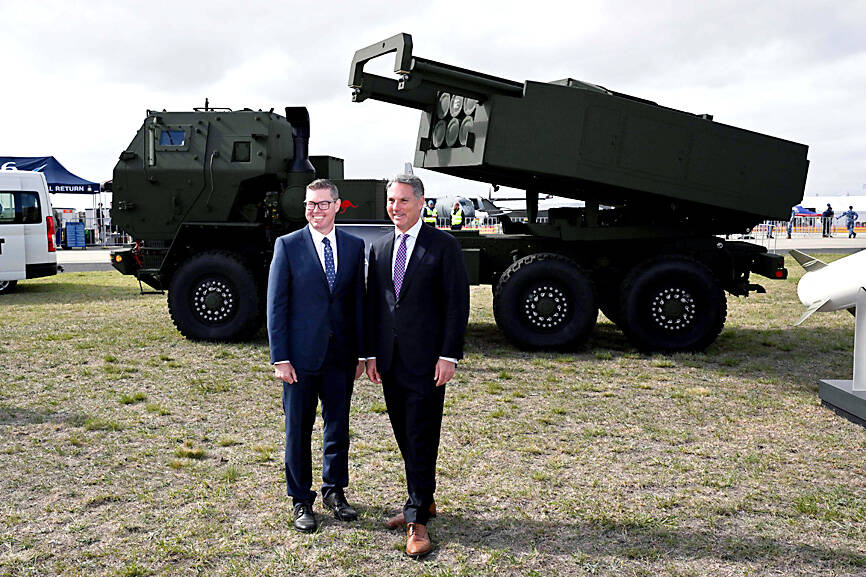Australia would not commit troops in advance to any conflict, Australian Minister for Defence Industry Pat Conroy said yesterday in response to a report that said the US was pressing allies to clarify what role they would play if the US and China went to war over Taiwan.
Australia prioritizes its sovereignty and “we don’t discuss hypotheticals,” Conroy said. “The decision to commit Australian troops to a conflict will be made by the government of the day.”
The Financial Times on Saturday reported that US Under Secretary of Defense for Policy Elbridge Colby has been pressing Australian and Japanese officials on what they would do in a Taiwan conflict, although the US does not offer a blank check guarantee to defend Taiwan.

Photo: AFP
Colby posted on X that the US Department of Defense is implementing US President Donald Trump’s “America First” agenda of restoring deterrence, which includes “urging allies to step up their defense spending and other efforts related to our collective defense.”
Australian Prime Minister Anthony Albanese, speaking in Shanghai at the start of a six-day visit to China that is likely to focus on security and trade, said Canberra did not want any change to the “status quo” on Taiwan.
Meanwhile, Talisman Sabre, Australia’s largest war-fighting exercise with the US, began yesterday in Sydney Harbor and is to involve 40,000 troops from 19 countries, including Japan, South Korea, India, the UK, France and Canada.
The war games would span thousands of kilometers from Australia’s Indian Ocean territory of Christmas Island to the Coral Sea on Australia’s east coast, in a rehearsal of joint war fighting, Australian Chief of Joint Operations Vice Admiral Justin Jones said.
The air, sea, land and space exercises over two weeks will “test our ability to move our forces into the north of Australia and operate from Australia,” Jones said.
“I will leave it to China to interpret what 19 friends, allies and partners wanting to operate together in the region means to them. But for me... it is nations that are in search of a common aspiration for peace, stability, a free and open Indo-Pacific,” he said.
US Army Lieutenant General Joel Vowell said Talisman Sabre would improve the readiness of militaries to respond together and was “a deterrent mechanism because our ultimate goal is no war.”

Right-wing political scientist Laura Fernandez on Sunday won Costa Rica’s presidential election by a landslide, after promising to crack down on rising violence linked to the cocaine trade. Fernandez’s nearest rival, economist Alvaro Ramos, conceded defeat as results showed the ruling party far exceeding the threshold of 40 percent needed to avoid a runoff. With 94 percent of polling stations counted, the political heir of outgoing Costa Rican President Rodrigo Chaves had captured 48.3 percent of the vote compared with Ramos’ 33.4 percent, the Supreme Electoral Tribunal said. As soon as the first results were announced, members of Fernandez’s Sovereign People’s Party

MORE RESPONSIBILITY: Draftees would be expected to fight alongside professional soldiers, likely requiring the transformation of some training brigades into combat units The armed forces are to start incorporating new conscripts into combined arms brigades this year to enhance combat readiness, the Executive Yuan’s latest policy report said. The new policy would affect Taiwanese men entering the military for their compulsory service, which was extended to one year under reforms by then-president Tsai Ing-wen (蔡英文) in 2022. The conscripts would be trained to operate machine guns, uncrewed aerial vehicles, anti-tank guided missile launchers and Stinger air defense systems, the report said, adding that the basic training would be lengthened to eight weeks. After basic training, conscripts would be sorted into infantry battalions that would take

GROWING AMBITIONS: The scale and tempo of the operations show that the Strait has become the core theater for China to expand its security interests, the report said Chinese military aircraft incursions around Taiwan have surged nearly 15-fold over the past five years, according to a report released yesterday by the Democratic Progressive Party’s (DPP) Department of China Affairs. Sorties in the Taiwan Strait were previously irregular, totaling 380 in 2020, but have since evolved into routine operations, the report showed. “This demonstrates that the Taiwan Strait has become both the starting point and testing ground for Beijing’s expansionist ambitions,” it said. Driven by military expansionism, China is systematically pursuing actions aimed at altering the regional “status quo,” the department said, adding that Taiwan represents the most critical link in China’s

‘REALLY PROUD’: Nvidia would not be possible without Taiwan, Huang said, adding that TSMC would be increasing its capacity by 100 percent Nvidia Corp CEO Jensen Huang (黃仁勳) on Saturday praised and lightly cajoled his major Taiwanese suppliers to produce more to help power strong demand for artificial intelligence (AI), capping a visit to the country of his birth, where he has been mobbed by adoring fans at every step. Speaking at an impromptu press conference in the rain outside a Taipei restaurant, where he had hosted suppliers for a “trillion-dollar dinner,” named after the market capitalization of those firms attending, Huang said this would be another good year for business. “TSMC needs to work very hard this year because I need a lot